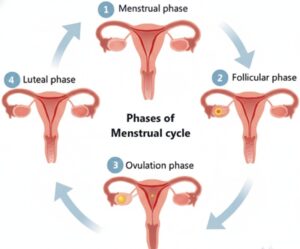Perimenopause Symptoms, Causes & Treatment

Perimenopause is one of those life stages that many women sense coming long before they understand what’s actually happening. A missed period here, an unusual hot flush there, mood swings that feel out of character, it’s easy to dismiss these signs until they start affecting your quality of life.
But understanding what is perimenopause and how it manifests can help you take control of your health, rather than feeling at its mercy.
In this blog, we will discuss perimenopause and its 34 symptoms you might not know. We will also discuss treatment options to help you confidently pass through this transition phase.
What is Perimenopause?
Perimenopause is the natural transition phase before menopause, when your body begins to shift from reproductive age to a non-reproductive one. While menopause is marked by 12 consecutive months without a period, perimenopause can begin up to 8–10 years before that final period.
Typically starting in the 40s or even earlier, this phase is driven by fluctuating levels of oestrogen and progesterone in your body’s key reproductive hormones. These changes affect the menstrual cycle but can also impact everything from mood to memory and sleep to libido.
Understanding Perimenopause Symptoms
Perimenopause is not the same for every woman. For some, it may involve irregular periods and night sweats. For others, the symptoms of perimenopause can extend into mental and emotional well-being significantly and can impact the life .
Hormonal shifts are at the root of most symptoms. As oestrogen levels fluctuate, sometimes dropping sharply, which can trigger a chain reaction affecting the brain, bones, skin, and more.
Understanding the indicators is the first step to managing them effectively.
The 34 Symptoms of Perimenopause
You may be surprised to learn that there are 34 recognised symptoms of perimenopause. While some are more common, others can be subtle and easily mistaken for unrelated health issues.
This table summarises the symptoms:
S.No. | Symptoms | S.No. | Symptoms |
1. | Hot flushes | 18. | Night sweats |
2. | Irregular periods | 19. | Nail Changes |
3. | Fatique | 20. | Mood swings |
4. | Depression | 21. | Anxiety |
5. | Memory Lapses | 22. | Sleep disturbances |
6. | Weight Gain | 23. | Difficulty concentrating (brain fog) |
7. | Breast tenderness | 24. | Brain Fog |
8. | Joint Pain | 25. | Muscle tension |
9. | Dizziness | 26. | Headaches or migraines |
10. | Vaginal Dryness | 27. | Loss of Libido |
11. | Gum problems or bleeding gums | 28. | Burning tongue |
12. | Electric shock sensations | 29. | Hair Loss |
13. | Increased allergy symptoms | 30. | Tingling Sensations in the Extremities |
14. | Osteoporosis risk | 31. | Digestive Issues |
15. | Frequent urinary tract infections | 32. | Irregular heartbeat |
16. | Urinary Incontinence | 33. | Changes in body odour |
17. | Panic Attacks | 34. | Palpitations |
It’s important to remember that not all women will experience all these symptoms. Some might only have a few, while others may face a majority over time. Severity can also vary from mildly inconvenient to significantly disruptive.
Causes Behind Perimenopause Symptoms
The primary cause is hormonal fluctuation, particularly the decline in oestrogen levels. Oestrogen influences numerous systems in the body, so when it drops, you may feel the effects emotionally, physically, and mentally.
Other contributing factors can include:
- Genetics
- Lifestyle (stress, diet, smoking, alcohol)
- Pre-existing medical conditions
These factors can shape how early perimenopause begins, how long it lasts, and how intense the symptoms are.
Effective Treatment Options
While perimenopause is a natural phase, that does not mean you have to suffer through it silently. Several treatment options are available to manage and ease the symptoms:
1. Lifestyle Adjustments
Exercising regularly, eating a balanced diet rich in minerals like calcium and vitamin D, and getting sufficient sleep can significantly reduce discomfort.
2. Hormone Replacement Therapy (HRT)
HRT is one of the most effective treatments for severe symptoms, particularly hot flushes and night sweats. The scientifically proven details about HRT should always be discussed with a qualified specialist.
3. Non-Hormonal Medications
For women who cannot take HRT, other medications like antidepressants or hypertension drugs may help alleviate certain symptoms like mood swings or hot flushes.
4. Supplements and Herbal Remedies
Supplements like calcium, magnesium, black cohosh, and phytoestrogens (plant-based oestrogens) are popular among women seeking more natural solutions. Before beginning any supplementation, always consult with your doctor.
5. Therapies and Support
Cognitive behavioural therapy (CBT) has shown benefits for managing anxiety, mood swings, and insomnia. Mindfulness, yoga, and group support can also be effective.
Regain Balance with Expert Help from Dr Aparna Gumma
Perimenopause may be a universal female experience, but every journey is personal. Recognising, understanding the 34 symptoms of perimenopause, and knowing what treatment options exist can help you to make informed decisions about your body and wellbeing.
If you’re still confused about what perimenopause is or if what you’re going through is “normal,” it’s time to speak to a medical professional who listens, understands, and provides guidance tailored to your unique needs.
Dr. Aparna Gumma, with over 29 years of experience as an accomplished Obstetrician-Gynaecologist and advanced Gynaecologic Laparoscopic Surgeon, brings a wealth of knowledge and compassion to women’s healthcare she is passionate about empowering women taking care of their health and has wealth of expertise in perimenopause & Menopause ,she has conducted private menopause clinic UK for several years before moving to Dubai .
Her impressive career includes key leadership roles in the UK, where she served as the Maternal Medicine Lead and Clinical Director for Medical Education.
Affectionately known as the “celebrity gynaecologist” in Dubai, Dr Aparna is recognised for her exceptional care and commitment to women at every stage of life.
Whether you’re in the early stages or overwhelmed by ongoing symptoms, she can help you feel like yourself again. Book a consultation today and take the first step towards reclaiming your hormonal health.
About Dr Aparna
Dr Aparna Devi Gumma, female gynaecologist in Dubai, is one of the most trusted partners in women’s health with over 28 years of expertise as an Ob-Gyn and Advanced Gynecologic Laparoscopic Surgeon.
Related Blogs

4 Phases of the Menstrual Cycle and How They Affect Your Moods
4 Phases of the Menstrual Cycle and How They Affect Your Moods The menstrual cycle affects far more than reproduction, yet it’s often dismissed as “just a period.” Many women learn it happens once a month and may be uncomfortable, without understanding how deeply it influences energy, focus, mood, motivation,

Healthy pregnancy meal plan: Essential nutrition guide
Healthy pregnancy meal plan: Essential nutrition guide Nutrition plays a vital role in a safe and healthy pregnancy. A well-structured, healthy pregnancy meal plan helps ensure your baby’s development while keeping you energised throughout your pregnancy. Knowing which foods to eat during pregnancy supports better pregnancy outcomes and overall well-being.

Types of vaginal discharge: What do they mean?
Types of vaginal discharge: What do they mean? Vaginal discharge is a normal, healthy, and essential part of the female reproductive system. It’s the body’s natural way of cleaning and lubricating the vagina, protecting against infection. However, changes in its colour, consistency, or smell can often be the first sign

The Menopause Diet: 5-Day Plan to Lose Weight
The Menopause Diet: 5-Day Plan to Lose Weight For many women, the midlife years bring a frustrating mix of hot flashes, mood swings, and gradual weight gain around the middle. The 5 day menopause meal plan to lose weight is not a “quick fix” diet, but a structured way to
